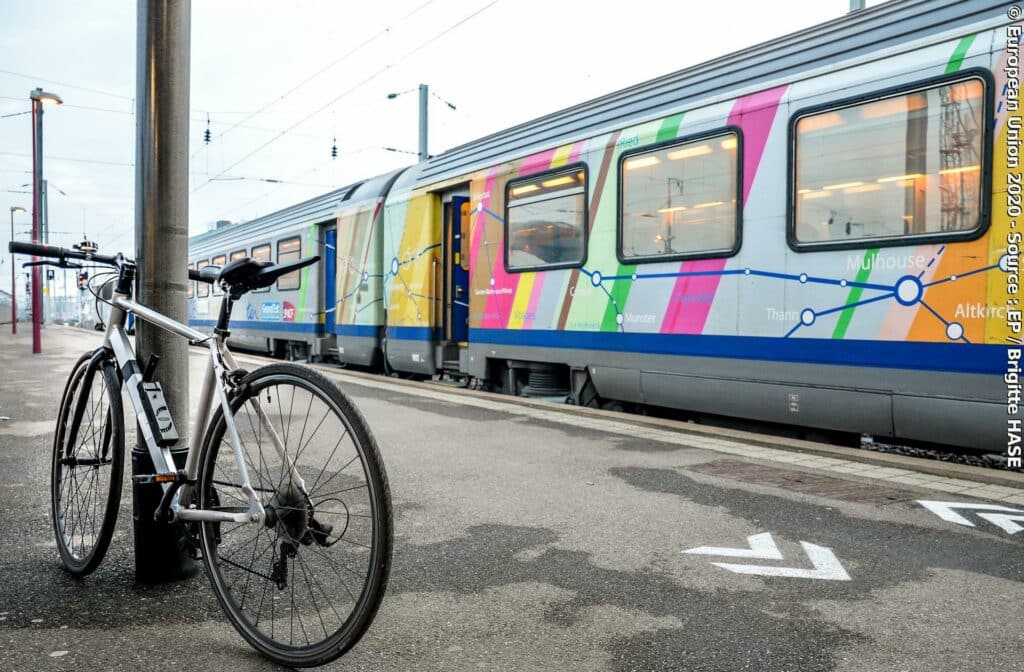What does Article 10 of the revised Rail Passenger Rights Regulation bring to travellers?
"If the EU aims to increase the number of passengers travelling by rail, consumers must be “flooded” with more sustainable options that are easily available through one-stop-shops platforms without any hassle" argues Guillaume Teissonniere, General Counsel at eDreams ODIGEO in his recent opinion piece drawing on the discussions on the 9th Florence Intermodal Forum.
This article by Guillaume Teissonniere, General Counsel at eDreams ODIGEO, originally appeared in the European Transport Regulation Observer “Towards EU-wide Intermodal Ticketing” (September, 2022).
When buying travel tickets, passengers search for complete information on travel time, price and increasingly on CO2 emissions. They make their decision based on several factors. As an online travel agent, we provide people with clear information about routes, duration and layovers. However, as independent ticket vendors, we frequently struggle with offering rail products as we encounter significant marketing restrictions from dominant and often state-owned railway companies to distribute their offers in a transparent manner. These dominant transport operators have often been using a strong power in their favour and ultimately prevent passengers from having access to the best rail offers on independent platforms. This ultimately harms consumers since passengers are treated differently based on which distribution channel they choose. We strongly believe that passengers have the right to appoint an agent who will act on their behalf, therefore, they should not be treated less favourably when opting for an indirect distribution channel.
We have been advocating for years for a regulatory intervention so all EU consumers have adequate access to travel services and unbiased travel information. If the EU aims to increase the number of passengers travelling by rail, consumers must be “flooded” with more sustainable options that are easily available through one-stop-shops platforms, such as eDreams ODIGEO, without any hassle. We recall that railway undertakings’ current practices (such as withholding contents) are directly hindering the efforts of the European Green Deal, the Sustainable and Smart Mobility Strategy and the European Commission’s Action Plan to boost long distance and cross-border passenger rail. This is also an obstacle for the development of a more sustainable European transport culture.
Therefore, we very much welcome the revised Rail Passenger Rights Regulation. Its provisions, laid down in Article 10, will improve consumers’ choice as railway operators are required to share real-time dynamic traffic data and travel information with independent ticket vendors. The possibility to have access to all available fares, information on delays, reservations and availability will shake up the rail distribution market and will give it a much-needed boost. More importantly, this would also end the current discrimination between passengers based on their choice of distribution channel.
The regulation applies as of 7 June 2023. All stakeholders need to ensure that everyone is ready. Railway companies must have a plan to be able to grant access to all ticket vendors on a fair and non-discriminatory basis. The European Commission needs to hold Article 10 enforcement to very high standards. National Enforcement Bodies designated under this regulation need to be ready to enforce the provisions of Article 10 in a standard and uniform format across the EU. The European Commission must prevent Article 10 from failing consumers through lack of enforcement.
The principles of Article 10 go beyond rail transport. Equal rights for all passengers also means equivalent rights in all modes of transport and through all distribution channels. The problems also exist in other transport modes. For example, dominant large airline groups are increasingly seeking to disintermediate and discriminate against indirect booking channels. This undermines fair competition among carriers and transport modes. There is no reason why the principles of Article 10 of the Rail Passenger Rights regulation regarding access to content should not be applicable in other transport modes. Such an obligation in all transport modes would also helpfully mirror a similar principle articulated by Recital 16 of the Regulation 1008/2008 on the Common Rules for the Operation of Air Services in the EU which states that consumers ‘should be able to compare effectively the prices for airlines’. Consumers’ right to compare prices effectively must be acknowledged. For an effective comparison, transport operators must give intermediaries comprehensive access to the data (including ancillary and other costs) so consumers are able to conduct a thorough comparison of fares.
Benefits of the uniform application of Article 10 provisions in all transport modes
Consumers
Consumers will, no doubt, benefit the most from the uniform application of Article 10 principles in all transport modes. Access to transport operators’ content provides consumers with a wider range of choices. Intermediaries can offer ‘like for like’ comparisons for consumers who will be able to save money and time. They will be able to easily compare different offers, allowing them to choose and pay for the services they really need.
Competition
Access to transport operators’ content based on fair, reasonable and non-discriminatory commercial terms will promote fair competition not only between transport operators but also between transport operators and independent distributors. As a direct consequence of Article 10, incumbent, and often state-owned, transport operators will no longer be able to monopolise access to fares, ancillaries, optional price supplements and charges.
Sustainability
Application of Article 10 provisions in all transport modes is also critical to the development of more sustainable and multimodal travel options. Consumers willing to shift to more sustainable transport modes must be provided with the most competitive choices in one place. Access to transport operators’ content provides intermodal competition as intermediaries will be able to display rail, air, coach and other transport modes in a one-stop-shop form. If the right offer is available to consumers, they will be able to make a conscious decision based on timetable, travel time, price and CO2 emissions.






